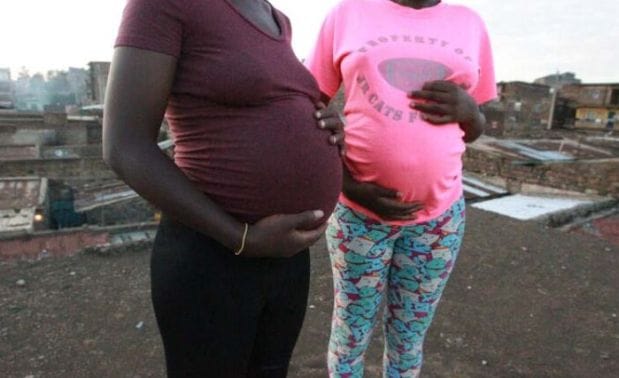In summary
- Teen mothers from Kibera slums are struggling to acquire sanitary pads and diapers
- Potential Impact of the Finance Bill 2024
- Alarming Statistics and Current Costs
The National Council for Population Development (NCPD) 2021 report highlights a worrying trend in Kenya,the rapid increase in teenage pregnancies.
The report indicates a strong correlation between poverty and higher teen birth rates, with low-income levels exacerbating the problem.
READ also:Ban Pregnant Teenagers from School-Lusaka
Real-Life Struggles: Susan’s Story from Kibera
Over the weekend, Ghetto Radio visited Kibera, one of Africa’s largest slums, and encountered Susan (not her real name), who became pregnant in class eight after a man promised her a pack of sanitary towels. Living alone with her father, Susan felt too ashamed to ask him for sanitary pads when she started her periods. Desperation led her to accept the man’s offer, unaware of the consequences.
“I come from Kibera and I’m a teen mother. I got pregnant while in class eight, though now I’m 20. I got pregnant because I was looking for sanitary pads. Living with only my dad made it difficult to get pads; asking him was too hard because I was scared,” she said.
Now a mother, Susan struggles to provide for her baby. “My child is fine, but I struggle to afford her basic needs like diapers. Sometimes, when I run out of money, I have to use plastic bags as makeshift diapers,” she added.
Potential Impact of the Finance Bill
Susan’s case is one of many in Kenya, and the proposed 2024 Finance Bill could exacerbate the situation. The bill seeks to remove the Value Added Tax (VAT) exemption on materials used in hygiene products, including the Acquisition Distribution Layer (ADL) essential for making diapers, sanitary napkins, and adult incontinence products.
Nelson Akoth, Youth Care Programmer Associate at NAYA Kenya, warns that this amendment threatens the progress made towards menstrual justice. “The proposed amendment to remove the VAT exemption on ADL 25-40gsm, effective July 1, 2024, is a threat to our efforts and gains towards achieving menstrual justice. It could increase the cost of hygiene products like diapers and sanitary napkins, disproportionately affecting low-income families and teenagers who are often exploited in sex-for-pad scenarios,” he said.
Akoth urged parliamentarians to consider the youth before voting on the bill, emphasizing the broader social implications.
“Limited access to affordable sanitary products can cause health issues, force adolescent girls to use socks, lead to school absenteeism due to menstrual stigma, and increase vulnerability to sexual and gender-based violence.
Higher diaper costs can strain young mothers’ budgets, affecting their childcare and educational opportunities due to competing priorities.
Policymakers should consider these social implications and explore alternatives to mitigate adverse effects on vulnerable populations, aligning with the government’s triple threat campaign and make decisions that propel the government’s triple threat campaign to end gender based violence, teen pregnancies and New HIV infections. ,” he added.
Alarming Statistics and Current Costs
According to the National Council for Population Development NCPD 2023 report states that 55% of the 1,499,514 pregnancies in Kenya were among adolescents and young women aged 10-24 years. Of these, 17% (254,753) were among girls aged 10-19, translating to 696 adolescent pregnancies daily.
Currently, a pack of sanitary pads costs Ksh 70 at retail shops in Kibera.

